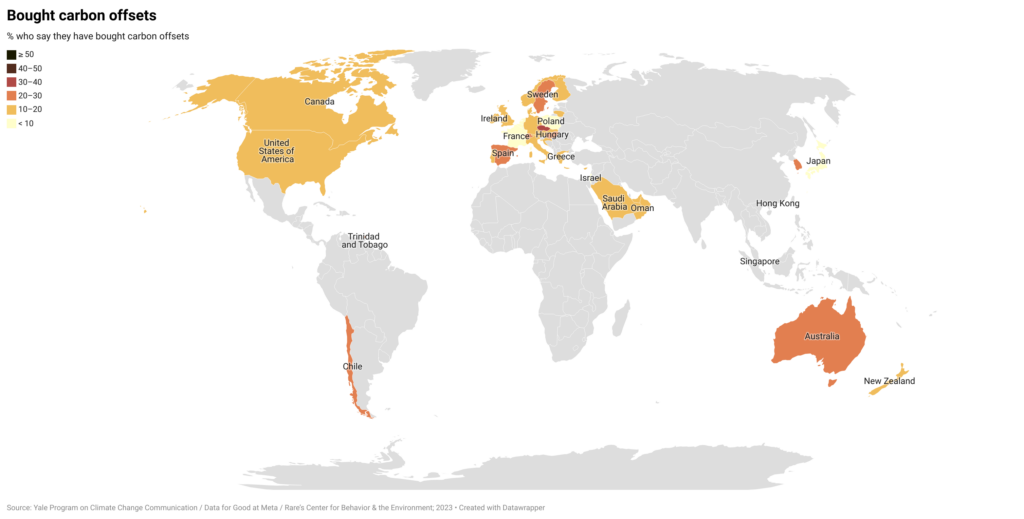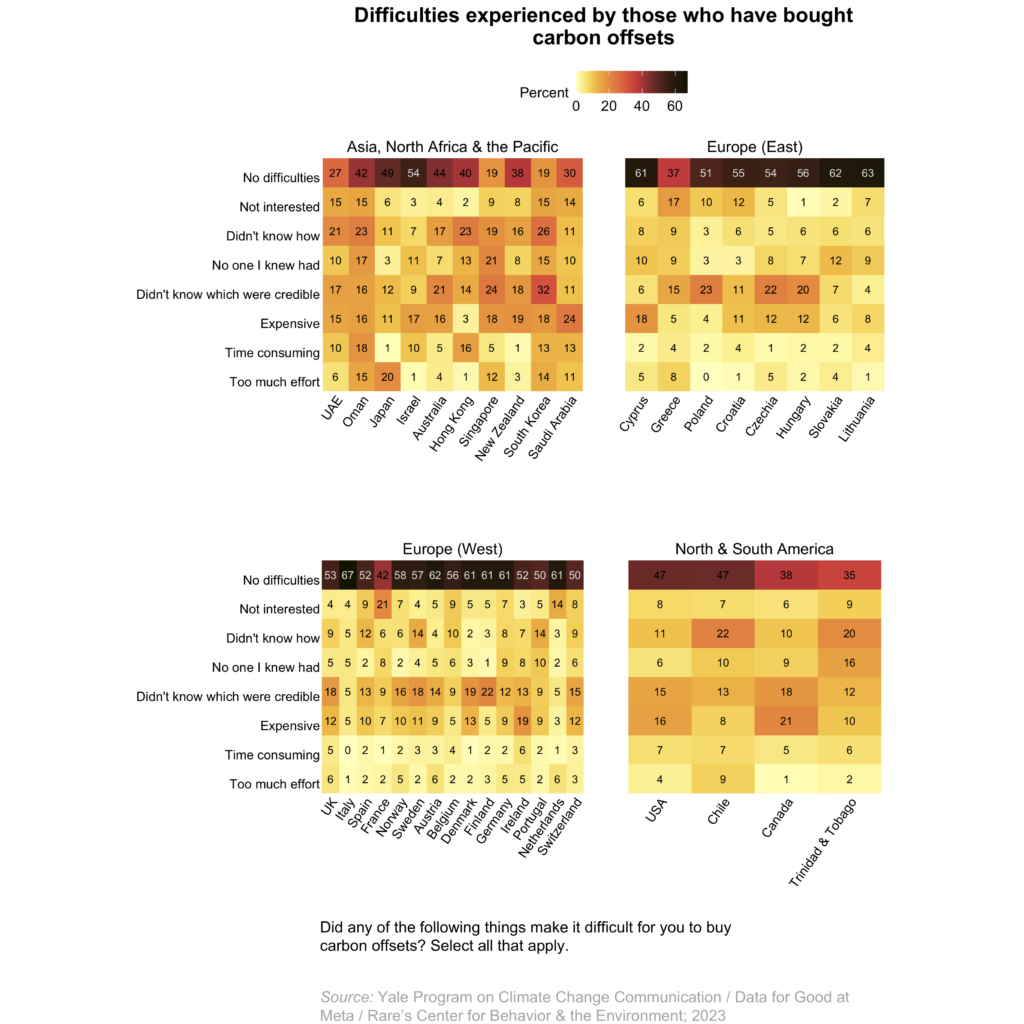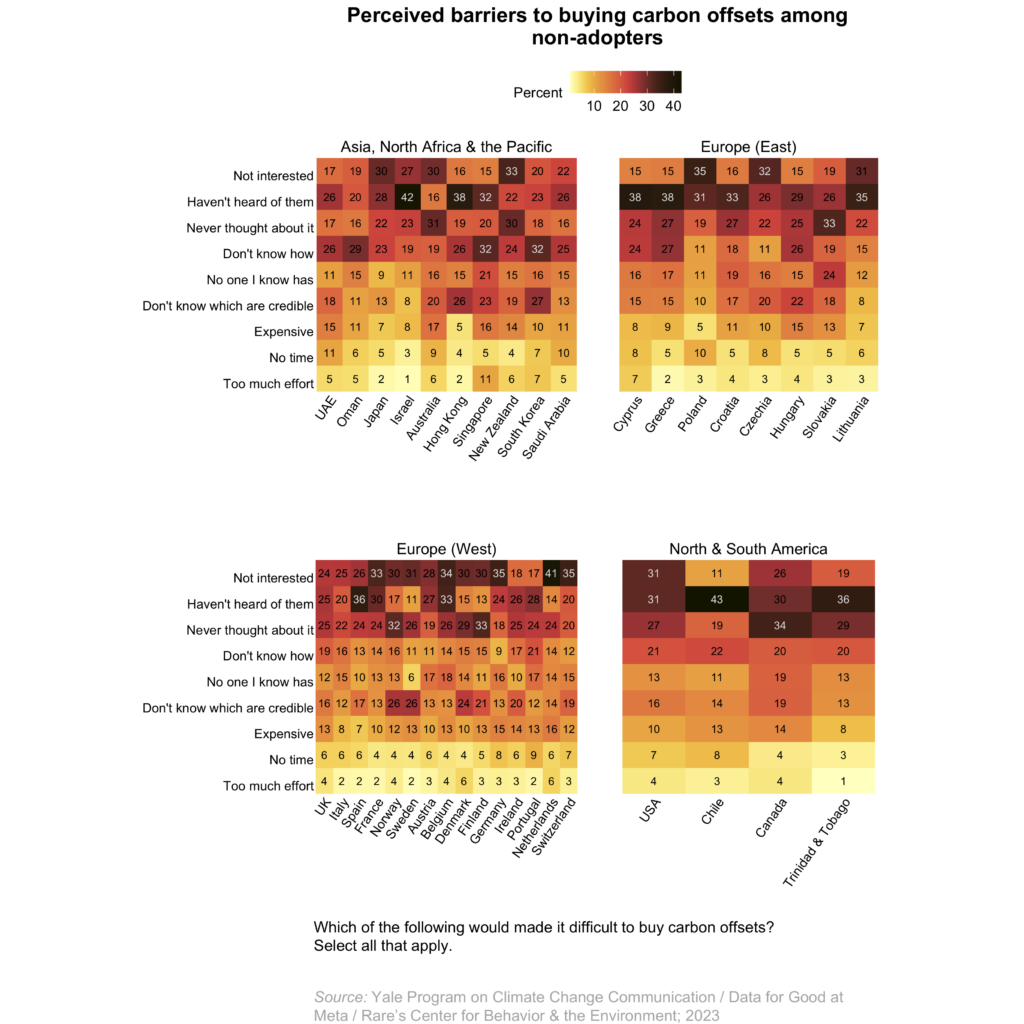Report · Jun 6, 2024
International Public Opinion on Climate Change: Household Climate Actions – Adoption and Barriers, 2023
By Anthony Leiserowitz, Jennifer Carman, Emily Goddard, Erik Thulin, Emily Wood, Marija Verner, Natalia Ordaz Reynoso, Seth Rosenthal, Jennifer Marlon and Nicole Buttermore
Filed under: Behaviors & Actions and Beliefs & Attitudes
4. Carbon Offsets
4.1. Relatively few respondents said they had ever bought carbon offsets.
Relatively few respondents said they had ever bought carbon offsets, which fund projects that reduce carbon (e.g., planting trees). Respondents in Czechia (30%), Sweden (27%), and South Korea and Chile (both 26%) were the most likely to say so, while respondents in Japan (7%), Israel (5%), and France (4%) were the least likely to say so.
4.2. Most respondents who have bought carbon offsets said they faced no difficulties doing so.
Among respondents who said they had ever bought carbon offsets, majorities in 22 out of 37 countries and territories said they did not have any difficulties doing so. On average, respondents in Europe were most likely to say they had not had difficulties, including in Italy (67%), Lithuania (63%), and Slovakia and Austria (both 62%). Respondents who bought carbon offsets were least likely to say they did not face difficulties in the United Arab Emirates (27%), and Singapore and South Korea (both 19%), meaning that they were most likely to say they faced some difficulties.
Respondents in Asia, North Africa, and North and South America were more likely to say that they had some difficulties buying carbon offsets. South Korea (32%), Singapore (24%), and Poland (23%) had the largest percentages of respondents who said they did not know which carbon offsets were credible.Respondents were allowed to select more than one answer to this question, unless they selected “I didn’t have any difficulties.” South Korea (26%), and Hong Kong and Oman (both 23%) had the largest percentages who said they did not know how to buy carbon offsets. Saudi Arabia (24%), Canada (21%), and Ireland and New Zealand (both 19%) had the largest percentages who said carbon offsets were expensive. Singapore (21%), Oman (17%), and Trinidad & Tobago (16%) had the largest percentages who said no one they knew had bought carbon offsets. France (21%) and Greece (17%) had the largest percentages who said they weren’t interested. Japan (20%), Oman (15%), and South Korea (14%) had the largest percentages who said they thought it would take too much effort. Finally, Oman (18%) and Hong Kong (16%) had the largest percentages who said it took a lot of time.
4.3. Among those who had never bought carbon offsets, the most common barriers were never hearing about them, not being interested, or never having thought about them.
Among those who said they had never bought carbon offsets, the most common reasons it would be difficult to do so (i.e., “barriers”) were that they had never heard of carbon offsets, they were not interested, or they had never thought about buying carbon offsets.Respondents were allowed to select more than one answer to this question.
Respondents in Chile (43%), Israel (42%), and Hong Kong, Cyprus, and Greece (all 38%) were all most likely to say they had never heard of carbon offsets. Respondents in the Netherlands (41%) and Germany, Poland, and Switzerland (all 35%) were most likely to say they were not interested in them. Respondents in Canada (34%), and Slovakia and Finland (both 33%) were most likely to say they had never thought about buying carbon offsets.
Among other barriers to buying carbon offsets, respondents in Singapore (32%), South Korea (32%), and Oman (29%) were most likely to say they did not know how. South Korea (27%) and Hong Kong, Norway, and Sweden (all 26%) had the highest percentages of respondents who said that they did not know which carbon offsets are credible. Slovakia (24%), Singapore (21%), and Croatia and Canada (both 19%) had the largest percentages who said no one they know has bought carbon offsets. Australia (17%), and Singapore and the Netherlands (both 16%) had the largest percentages who said carbon offsets are expensive. The United Arab Emirates (11%), and Saudi Arabia and Poland (both 10%) had the largest percentages who said they don’t have the time. Finally, Singapore (11%), and Cyprus and South Korea (7%) had the largest percentages who said it is too much effort.


